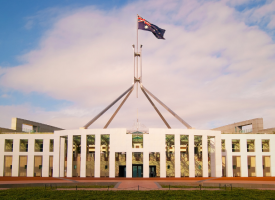Dr Tony Bartone - RN Breakfast - Coronavirus
Transcript: AMA President, Dr Tony Bartone, Radio National, RN Breakfast with Fran Kelly, Wednesday, 11 March 2020
Subject: Government response to coronavirus outbreak
FRAN KELLY: Around 100 coronavirus clinics will open across the country in a bid to contain the outbreak and alleviate pressure on GPs and hospital emergency rooms. These fever clinics are the centrepiece of a $2.4 billion medical response to COVID-19 virus, which will also include a dedicated Telehealth service number - a Medicare number - and a national information campaign to better educate the public about the virus. Dr Tony Bartone is national President of the AMA. The AMA is helping the Government work out sites for the pop-up health testing centres. Tony Bartone, welcome back to Breakfast.
TONY BARTONE: Good morning, Fran.
FRAN KELLY: Fever clinics, GP video calls, Telehealth for people isolating at home; how much will this help stop the spread of coronavirus?
TONY BARTONE: It will go a significant way to reducing the movement and the spread in the community of people potentially affected by the virus, as we're getting to see more cases of community-based transmission. It's about ensuring that we've got the capacity to keep people potentially separated or segregated from other non-infected community members to try and reduce that spread, and therefore reduce the overall impact and immediacy of that impact on overstretched public hospital services while they continue to ramp up and increase their surge capacity in expectation of increased demand.
FRAN KELLY: Are we a bit slow in getting to this? The AMA's been speaking, I think, for at least a week, calling for the Telehealth Medicare number so doctors could- didn't have to get people into the clinics, which is obviously a transmission threat. It's- the first community transmission in this country was the 2nd of March. Were we a bit slow, a bit behind on this?
TONY BARTONE: Look, at the end of the day, Fran, they had the roundtable last Friday. We at the AMA made the case very clear for a number of weeks, in fact as far back as the bushfire crisis, that there existed this opportunity, this capacity, and we've been very strident and very forceful in our advocacy. And we're just pleased to see this announced and implemented by this Friday, with the measures that have been outlined.
FRAN KELLY: Let's talk about the testing clinics; because it's chaos at some of these hospitals and fever clinics at the moment, you know, there's lines and lines of people, which can't be safe, you'd think, given the transmission of this virus. Who's going to- where are these pop-up clinics going to be? Are they going to be linked to surgeries already or hospitals? Or where are they going to be, shopping centres?
TONY BARTONE: So, the plan is that, in association with the PHNs and the College, the AMA will help identify with the Government the location of these facilities. Now, these facilities will have to be distributed through the community and based on, you know, the population and resource needs, so we don't have three next door to each other. And obviously, distributed across to meet the community and the demand. There'll obviously have to be some interplay and some relationship with the local hospital, because obviously these clinics pick up and identify patients who do need to be further managed and perhaps transferred. There needs to be the ability to have that transport to the hospital facility.
So, they'll be based on capacity; they'll be based on infrastructure, capability of that clinic. So ideally, larger clinics with multiple entrances which allow, you know, a dedicated part of that clinic to be isolated from the rest of the clinic to allow the clinic to continue to function and offer the regular GP services that are required by up to 2.6 million Australians every week of the year.
FRAN KELLY: And will these fever clinics, these pop-up clinics, will the test be bulk billed?
TONY BARTONE: Absolutely. So, this is the whole nature of the thing. This is about ensuring that socio-economic class or any other aspect is not a barrier to this really important process at this time. So, these clinics will be facilitated by additional funding by Government to allow them to identify and do the necessary testing and then identification, if necessary, and follow-up clinical protocols for those isolated at home, to be managed at home.
FRAN KELLY: Okay. I think as an important message it needs to get clearly through to people at the moment, because part of the reason the current clinics are so overcrowded is people are going there who probably don't need testing, but people are unclear. There's been some mixed messages coming out of our Government and authorities, to be frank. Can you explain for us, clearly now, at what point a person with cold, flu-like symptoms should walk into a clinic, instead of calling their GP?
TONY BARTONE: So, they should- a person as you describe with symptoms of a cold or flu that fits the criteria, that is absolutely the testing criteria, and that is either recent overseas travel or a contact with a confirmed case. If those two measures are part of that, that's what the Chief Medical Officer is still advocating is the group that needs to be tested at this stage. We're still not advocating widespread community testing of anyone with a sniffle. That indeed may change over the next little while, but at this stage we're still looking at trying to identify cases, isolate them, and do the contract tracing, to contain the spread. And so it's important that we keep the demands on the pathology testing for this to the appropriate ones.
FRAN KELLY: So, I'm just going to get that very clear. If you haven't been overseas recently, if you haven't been in contact with someone who is confirmed as testing positive to this virus, you shouldn't bother going to get a test - you don't need a test. Do you need to stay home for two weeks or just treat it like a normal cold?
TONY BARTONE: Yeah. Okay. So therefore then the next step is obviously then make contact with your doctor who will then, potentially through one of these Telehealth consults if you don't want to come down to the clinic, be able to take a much more thorough history and see if you fit any secondary or tertiary reasons why you would consider further testing. And of course, as part of the testing, we are also doing other respiratory viral tests to identify cases.
So, there's another process or step in that process. But for the general community with just a sniffle or some-cold like symptoms, that's not a reason unless you've got another index of suspicion as to why you think why that's the case.
FRAN KELLY: Okay, so remain calm about a sniffle unless you got one of those criteria. Does the same go for Telehealth? That you're only eligible for this Telehealth bulk billing number if you've got certain criteria?
TONY BARTONE: So yes. There will be an agreed and well-constructed triage protocol, the information protocols that you will have to go through. And if you can satisfy the criteria of that protocol, you will then be put through to the doctor for a Telehealth consult. That will probably change over time but at this stage that's the best use of the facility. Obviously in time, those people with confirmed cases or people that were told to stay behind and self-isolate will then have subsequent consultations over the phone or over the video channels to ensure that we continue to monitor these people, and ensure that if they do need further attention they're getting it and sent off to the appropriate facility.
FRAN KELLY: You're listening to Breakfast, it's 18 minutes to eight. Tony Bartone is the President of the AMA. The advice coming from the Chief Medical Officer daily has been very helpful, and I think there's a lot of trust in that health advice we're getting from people like him and you and others. But the process has been a bit wanting. GPs have been complaining about their lines of communication, the messaging they're getting from the Government, and also the lack of equipment that they have - the lack of masks, sanitiser for the people working in these clinics. Will there be adequate protection to deal with the crisis across all these clinics? And have you fixed that problem? Has that problem been fixed?
TONY BARTONE: Well, certainly, Government and all of the authorities have heard loud and clear the inconsistency of supply at the frontline - that's been addressed as recently as over the weekend. There's been another additional release from stockpile of 260,000 masks. We've had the announcement over the weekend of another procurement of 54 million masks to be added to the stockpile in coming weeks. The announcement today of the investments in further PPE - personal protective equipment - is welcome. But we do need to have much more timely and logistically coordinated supply, and that's still an area we will carefully and continually monitor the feedback from the frontline -
FRAN KELLY: [Interrupts] Well this very critical, just briefly, we're out of time. But does that mean doctors are still going to Bunnings to get their masks?
TONY BARTONE: Well, they're certainly not going to Bunnings, but some doctors are trying to use alternative measures and means to get access their equipment.
FRAN KELLY: Tony Bartone, thank you very much for joining us.
11 March 2020
CONTACT: John Flannery 02 6270 5477 / 0419 494 761
Maria Hawthorne 02 6270 5478 / 0427 209 753
Follow the AMA Media on Twitter: http://twitter.com/ama_media
Follow the AMA President on Twitter: http://twitter.com/amapresident
Follow Australian Medicine on Twitter: https://twitter.com/amaausmed
Like the AMA on Facebook https://www.facebook.com/AustralianMedicalAssociation



